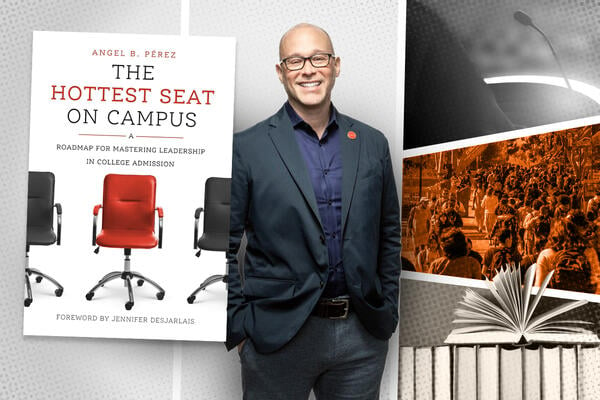
Angel Pérez Book Outlines Advice for Admissions Leaders
It’s a trying time to be an admissions dean.
More than two years after the Supreme Court ruled that colleges and universities could no longer consider race in admissions decisions, the Trump administration has launched a crusade to ensure institutions are abiding by that decision. Government officials have demanded colleges submit detailed data on the racial makeup of their admitted students, cast suspicion on so-called proxies for race in the admissions process and required some universities to reform their admissions practices—without specifying what, exactly, needed changing. (The administration has also used the decision as justification to call for the cancellation of other diversity, equity and inclusion initiatives, from scholarships to student lounges.)
Then again, according to Angel Pérez, a longtime admissions dean and the president of the National Association for College Admission Counseling, it’s never not a trying time to be an admissions dean.
Hence the title of his forthcoming book, The Hottest Seat on Campus (Harvard Education Press), which he admits freely to have borrowed, albeit subconsciously, from a 2014 Chronicle of Higher Education feature. Admissions deans are incredibly visible, he said in a recent interview with Inside Higher Ed; their failures and successes are known to all—and have consequences well beyond their own offices.
Now, as these leaders grapple with the new challenges the Trump administration has brought—and as the first day of NACAC’s annual conference kicks off in Columbus, Ohio—Pérez hopes his book, which is built upon interviews with dozens of admissions leaders from across the country, will prove an important resource for others struggling to navigate the hot seat. Inside Higher Ed spoke with him over the phone about his advice for admissions deans and the changing landscape of higher education.
The interview has been edited for length and clarity.
Q: I wanted to start off by asking about your personal story. What made you interested in holding an admissions role yourself?
A: I think my story is actually very typical of most people who go into the admissions profession. I still call myself an accidental admissions dean—this is not what I was supposed to be doing for a living.
So many people go into the admissions profession by actually being involved on their college campus, as was I. I was involved in student activities, I was a residence hall director, I dabbled in tour guiding. The dean of students at Skidmore [College], Dean Joe Tolliver, who has now retired but is still very active in student affairs, said to me, “You’d be really great in higher education. You should consider a job in higher education.” And to be honest, I didn’t think that those were real jobs, on a college campus. So, I didn’t take it very seriously until someone in the admissions office, Roslyn Estrada, said to me, “Angel, there’s going to be an opening in the admissions office. You should apply. You’d be really good.”
And eventually I said yes to applying because I thought I would go and do that for one year until I found a real job. And many, many years later, here I am, and [I am] delighted that I took that calling.
So, it was really the taps on the shoulders. But I will say—it’s one of the reasons I’ve written the book—that I think we need to change that paradigm and I think we need to change that pathway. I want to create much more intentional pathways into the profession and I want to create much more intentional pathways into leadership.
Q: What would that look like? Do you guys have any initiatives currently underway that are trying to create more intentional pathways?
A: [NACAC has] launched a program called NEXT, where we work with admissions counselors who are one to three years in to basically help them understand what growth in the profession can look like, what a pathway can look like.
The second thing is that, thanks to the support of Strada Education Foundation, we are actually going to be launching a brand new dean’s fellowship, starting in 2026. This is in order to support brand-new deans who are moving into these chairs and cultivate them into leadership. In the book, in the spirit of me being the accidental dean, I write about the fact that one day I was the director of admissions, and the next day, my boss retired and said to me, “The president would like to speak to you.” And then, all of a sudden, I was the vice president for enrollment, and my job was so fundamentally different. That happens to so many people—it’s kind of like sink or swim. What we want to do at NACAC in the future is create much more intentional leadership growth for deans.
One thing that I aspire to do—we’re not there yet; I’m still looking for the funding—is actually to create a program where those tour guides on college campuses and student interviewers, I would like to actually create a NACAC fellowship for them to learn about what it’s like to go into the profession, to give them a mentor as they’re applying for their first job out of college, into the admissions profession, and then make them a part of the NACAC community.
Q: I enjoyed the section of the book where you were talking about admissions deans as storytellers. Could you describe how that storyteller role differs from others on campus and also how effective storytelling translates to outcomes for the admissions office?
A: I always have believed that that admissions deans are chief storytellers of an institution. The reason I say that is because they have such a large constituency. They’re not just telling stories on their campus; they’re also telling the story of the institution outside of campus, right? They’re talking to high school counselors. They’re talking to students. They’re talking to people like you, for example, in the media who are trying to understand the complex admissions world that we have built.
What I have seen in my experience is that so many admissions deans fail in the role because they did not embrace the role of storytelling. A big part of their job is to actually educate the community about the challenges of enrollment, to educate the community about the fact that enrollment is all about trade-offs; in the environment that we’re living in, everybody’s not going to get what they want on campus.
Q: You describe navigating admissions during COVID-19 and the bungled FAFSA rollout of 2024. What takeaways from those two events have stuck with you going forward?
A: These are really the messages that I took away from the teams that I interviewed. One is, during both of those crises—but I would argue any crisis—the importance of communication. I mean, we were just talking about storytelling, right? The importance of bringing your staff along, your constituents, making sure that people are feeling informed, even during incredible uncertainty. We’re living that again right now, so the book is very timely.
I think the other thing that stands out for me—something that, again, was highlighted through these amazing deans I interviewed in the book—is the importance of building teams and making sure that you rely on those team members and not carry the weight of leading in crisis by yourself. I think the leaders who crashed and burned during COVID, during the FAFSA debacle and during all of the different crises that we face, these are individuals who try to do it all by themselves. The reality of the matter is none of us can do it by ourselves. If you can put together a really diverse team who thinks differently, who complements each other in different diverse ways, you’re going to be set up for a lot more success. And obviously empowering them is going to be a big part of that as well.
Q: On a similar note, this book was written before the series of crises that we’re going through with the Trump administration’s attacks on higher education. Is there any piece of advice you would add to the book if you could about navigating this current moment?
A: I think so much of the advice [in the book] actually is very much translatable to what’s happening today. The difference is, the level of change is coming so much faster than ever before, even faster than COVID, even faster than FAFSA, because every day the Trump administration could say something that fundamentally upends how we do our work. I think that’s what’s different.
So if I could have a whole other chapter in the book, I would actually focus on how to lead in an era of uncertainty, and the skill sets that you need, personal and professional, to actually navigate change that’s coming faster than ever.
One of the quotes [that] I use in every presentation I do right now is from Justin Trudeau, and this quote just blows me away. He said it at the World Economic Forum: “The pace of change has never been this fast and it will never be this slow again.” To me, that is our new reality. And so I think I would focus a lot on, how do you keep organizations stable when the news cycle is changing every single day?
The other thing that I would focus on is actually how to be unresponsive. What I mean by that is oftentimes we’re so wired to jump at the crisis of the day. One of the things the dean said to me really recently last week was “You know what? Every time news comes out now, I just sit and I wait, because it might be different tomorrow.” And so there’s also this skill set that I think people need to build of not overreacting when the news cycle is breaking every single day. It’s tough. We’re living in tough times.
Q: If you could go back in time to when you were first starting in admissions, what is one piece of advice that you would give yourself, either from the book or just off the dome?
A: I think I would say to myself, “Enjoy this moment.” And the reason I would say that is because so many young admissions counselors are so eager to rise in the ranks very quickly. As you saw in the book, I talk about it: The faster you rise up the ranks, it becomes a lot messier and murkier and sometimes painful. As a dean, there were many more days that I longed for the simplicity of being on the road, recruiting students, spending my days in high schools and then going back home and reading applications from kids all over the world. It was such a beautiful job with not a ton of pressure.
But then, obviously, I was an eager beaver, and I climbed the ranks actually very quickly; I became a dean in my early 30s. I now wish that I had said to myself, “Slow down, enjoy this moment, and don’t be too quick to rise, because those pressures are going to be very, very different.”
Source link



